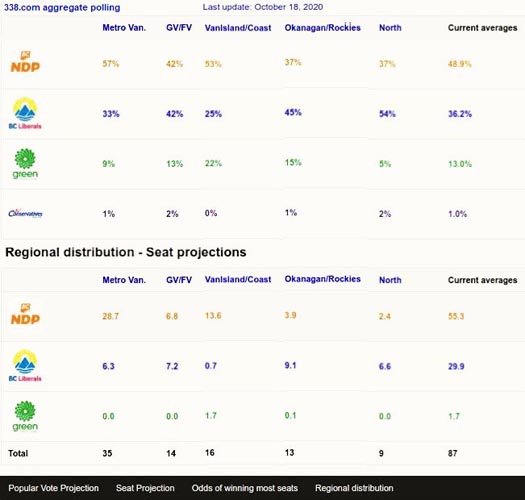
Having won the leadership of the B.C. Liberal party on Saturday, February 26, 2011, the newly anointed, but unelected, Premier Christy Clark had two years to put her imprimatur on the party of government before she was compelled by law to call a provincial election for May 14, 2013.
Meanwhile, the British Columbia New Democratic party, having jettisoned party leader Carole James also had a newly-elected leader, Adrian Dix, who achieved a three-ballot win on April 17, 2011, defeating his challengers, Mike Farnworth (recent Minister of Public Safety and Solicitor General), and John Horgan (current B.C. Premier) in a closely contested race.
Hope reigned for both British Columbia mainstream political parties.
As fortune would have it, though, with Ms. Clark in the Premier’s chair, B.C. Liberal prospects for re-election were dire, despite the new leader, arising from the memory of folks who were less than pleased with the HST fiasco, that saw the resignation of both B.C. Liberal Premier Gordon Campbell, as well as his Finance Minister, Vancouver-Quilchena MLA, Colin Hansen.
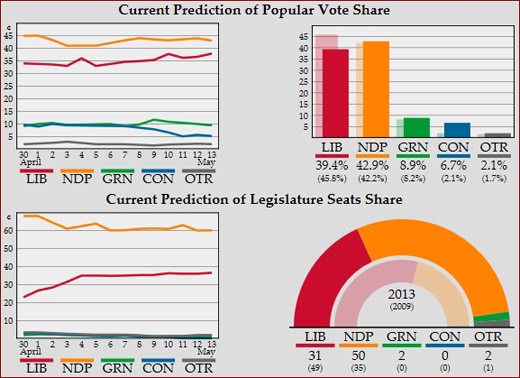 UBC’s Sauder School of Business 2013 B.C. Election Prediction Market forecast |
As the clock ticked down towards the 2013 provincial election, month after month polls showed Ms. Clark and her B.C. Liberal party to be often far behind Adrian Dix and the NDP, with an average of 36.5% support among the electorate, while an invigorated B.C. NDP with Adrian Dix at the helm was polling consistently at around 46% among declared voters.
The forces of capitalism in our province were verklempt about the potential for an Adrian Dix-led BC NDP forming government after May 14, 2013.
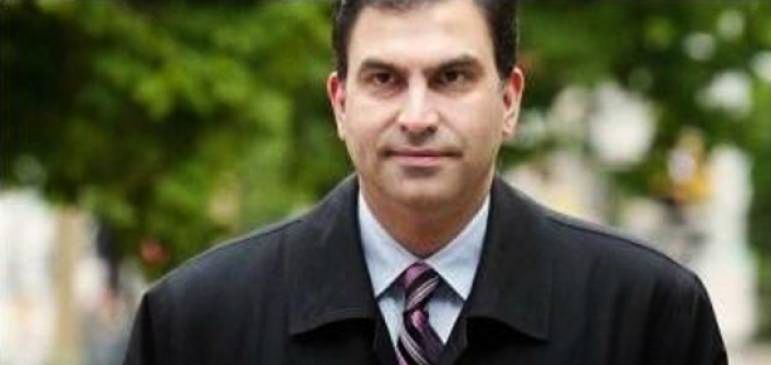
Dimitri Pantazopoulos, right-of-centre federal, provincial, civic election whisperer
The B.C. Liberals and their powerful backers had an ace up their sleeve, though, in the form of renowned Stephen Harper pollster, boy genius Dimitri Pantazopoulos — who had not only delivered government after government to Stephen Harper, but had performed the same function for the B.C. Liberals and the right-of-centre Vancouver municipal political party, the strangely named and alleged (but not really) Non-Partisan Association.
In February of 2013, Mr. Pantazopoulos and his team from Maple Leaf Strategies travelled out to B.C. to conduct some very expensive and intensive polling across all, then, 84 British Columbia constituencies. After a month in the field, Mr. Pantazopoulos reported back to B.C. Liberal campaign manager Mike McDonald and Premier Clark, telling them this …
“Of the 84 ridings across the province, 34 are unwinnable. The B.C. Liberal party shouldn’t spend a plug nickel in those ridings, should write them off, and focus on the 50 ridings where the party has a good chance of prevailing come the evening of Saturday, May 14th. You’ll want to make sure that you have first-rate candidates in those 50 ridings, who are well known to voters, and can run a winning local campaign. The party must place massive resources into those ridings in order to ensure a win.
As U.S. Speaker of the House Tip ‘O Neill once said, “All Politics is Local.”For my part, my team of leading strategists I’ll be bringing out west from Maple Leaf Strategies will conduct nightly polling in those 50 ridings, to ensure that we have the pulse of the electorate in each of those 50 winnable ridings. I’ll let you know what the issue of the day is in each of those ridings, and your communications team will have to write a press release ready for distribution first thing the following morning, and have a campaign official meet with each of the candidates in the winnable ridings to instruct the candidate as to what to say when the press comes calling.
The B.C. Liberal party must run a hyper-local election campaign — that’s the only way you’re going to win when you’re so far down in the polls.”
Turning to the Premier, Dimitri Pantazopoulos told Ms. Clark, “Come election night, you’re going to win 50 seats and form a majority government. I am going to put my reputation on the line, and tell you right now that I guarantee a 50-seat win for you on May 14th. You can take that to the bank.”
Many in the B.C. Liberal party thought that Mr. Pantazopoulos was talking out of his hat, that he was nuts — but the only voices that counted among the din were that of Mr. McDonald and Premier Clark, who voiced full confidence in Mr. Pantazopoulos to pull out a majority win for the B.C. Liberal party. And thus, one of the central tenets of the 2013 B.C. Liberal British Columbia election campaign was in place, no questions asked.
In fact, Mr. Pantazopoulos and his crack team of Maple Leaf strategists were out in the field every night, specific communications were drafted for each of candidates in the 50 winnable ridings ready for distribution each morning, and 50 senior B.C. Liberal campaign officials were on the ground with the local candidates prepping each candidate on what to say to the press, and the issue to focus on that day on the campaign trail.
On election night 2013, May 14th, with Vancouver-based real estate marketer and B.C. Liberal financial guru Bob Rennie standing by her side, Dimitri Pantazopoulos looked Premier Clark directly in the eye, telling her, “Premier Clark, you’ve got this in the bag. I promised you a 50-seat majority government, and in just a couple of hours, I’ll deliver those 50 seats to you. By 8:30pm, media across the province will be reporting a landslide win for the B.C. Liberal party.”

Indeed, as per the graphic at the top of today’s post, Dimitri Pantazopoulos was right: contrary to the polls, Premier Clark was handily elected as B.C. Premier, with a comfortable 17-seat majority government, having defeated a now stunned and beleaguered British Columbia New Democratic Party.
Was Mr. Pantazopoulos a genius, had he pulled off the impossible? Here’s what a fellow pundit had to say to VanRamblings last week when we were discussing the role of Dimitri Pantazopoulos in the 2013 British Columbia provincial election …
“I know Dimitri. I like Dimitri. I’ve worked with Dimitri, and I can tell you, he’s a good guy. Was he solely responsible for the B.C. Liberal win in 2013, when we were working on opposite sides of the fence? I’d have to say no to that. But, let’s face it, Raymond, there’s no arguing with the results. Dimitri promised 50 seats, he delivered 50 seats. That counts for something.”
So, maybe Dimitri Pantazopoulos is not quite the boy genius VanRamblings painted his as on social media last week.
Certainly, there were other factors at play that contributed to the diminution of the BC New Democrat campaign, and the rise of Premier Clark and the B.C. Liberals, a topic we’ll explore in part two, tomorrow.
For today, let us leave you with this.
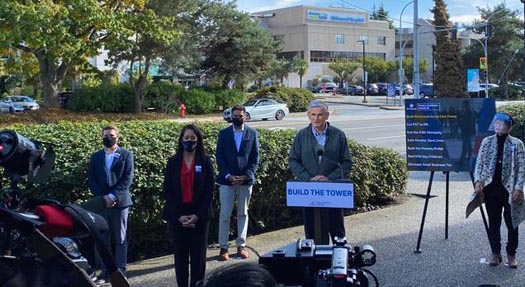
In 2020, when Dimitri Pantazopoulos arrived in BC in early September — as a “snap” B.C. election seemed a near certainty — Maple Leaf Strategies intensively polled across the province for two weeks, and here’s what they found: the B.C. Liberals were a lock to win only seventeen seats, although the party might be competitive in another fifteen ridings.
Mr. Pantazopoulos advised B.C. Liberal leader Andrew Wilkinson that his becoming 37th Premier of the province was not in the cards, that in order to avoid embarrassment, the party must focus on the thirty-two winnable ridings, and pour party resources into those ridings.
And thus the 2020 campaign has played out.
The B.C. Liberal party and Mr. Pantazopoulos and his Maple Leaf Strategies team are laser focused on 32 ridings, in Richmond, in Surrey, in Langley and the Fraser Valley, in the Okanagan and in the Interior and the North, where the party continues to be either a few points behind the New Democrats or are running a neck-and-neck campaign.
In 2020, the B.C. Liberals are in a fight for their lives, are not looking to pick up seats, but maintain as many of the seats they currently hold in the Legislature, as possible. Andrew Wilkinson knows Sam Sullivan will lose in Vancouver-False Creek — there’s no love loss between the two, and although Mr. Wilkinson regrets losing the seat, it’s more than made up for by not having Mr. Sullivan in the B.C. Liberal caucus.
In the final week of the campaign, you can expect to see Mr. Wilkinson focusing on Surrey, Richmond, the Fraser Valley, Kamloops / the Shuswap, south central B.C., Prince George & region, Skeena & the North. Everything else is a write-off, and unworthy of the leader’s time, and party resources.
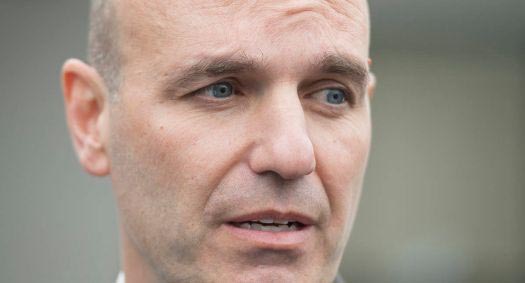
Certainly, the foofaraw around comments made by star Stikine candidate Nathan Cullen have done nothing to either aid the cause of Mr. Cullen — John Horgan’s likely next Finance Minister — nor Skeena NDP candidate Nicole Halbauer, both of whom were expected to win in walk. No more.
All things being equal though, and barring any more NDP self-inflicted wounds, John Horgan and the B.C. New Democrats remain on track to form a majority government in Victoria, thanks in large measure to a textbook, near faultless and winning 2020 NDP campaign, and the fine work of recent — and one would hope, soon again — British Columbia Health Minister Adrian Dix in what is, after all, the “pandemic election”, where the health of British Columbians and fighting COVID-19 remains top of mind for voters.
C’mon back tomorrow to VanRamblings, for Part 2 of our “getting down to brass tacks” reasons as to why and how the 2020 British Columbia election remains significantly different than the 2013 provincial election campaign.
